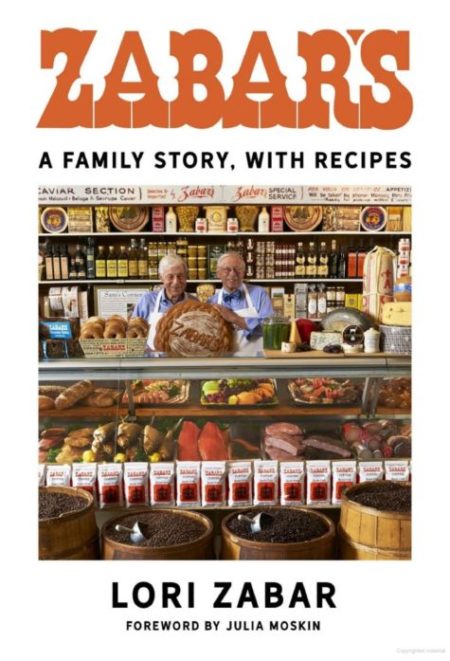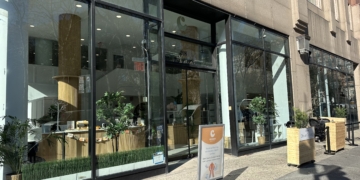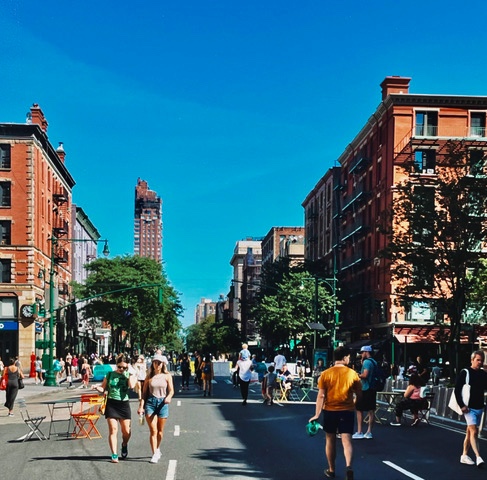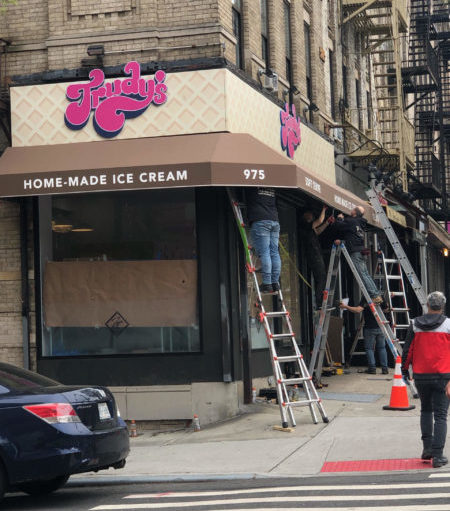By Catherine Morrison
If Zabar’s closed I would have to leave the Upper West Side. Their cheese blintzes are my dietary staple. Not the ones in the Prepared Food Section, but the ones in the case perpendicular to the sushi. Cheese only, please. Are they as good as my mother’s? Almost.
Devotion to the store extends well beyond me; it is an ancillary home for countless customers on the Upper West Side. We know where everything is shelved or sliced. We expect the best, and we get it.
Lori Zabar’s posthumous memoir of her family and the store is a story about home in the truest sense of the word, told -– as the best stories are —- with love. Lori died three months to the day before this book was published, at the age of 67 from cancer, but friends say she worked on it to the end.
“It was important to Lori to capture the history of the family while it was still retrievable in texts or memories,” her dear friend Carol Loewenson told me. “Lori was a meticulous researcher, reviewing the proofs and checking the captions. She loved details, and how the details told the story.”

Lori begins in 1920 when her grandmother, Lilly, fled Ostropolia, the family’s home in “the Ukraine” to come to America. Lilly’s friend Rose Zabarka and her sister Ada found their way to New York City as well. Their brother Louis arrived in the winter of 1921. He never talked about what he had witnessed. Life began when he came to America.
Louis was offered a job in his cousin’s grocery store. Little or no investment was required to become a grocer. Shops with apartments above could be rented cheaply; goods could be acquired on credit. Overhead was low because family members worked long hours.
In 1927, Louis (now Zabar) married Lilly. A succession of stores followed in Brooklyn, each one larger than the last. And a succession of sons – Saul, Stanley and Eli.
THE UPPER WEST SIDE
When retail space became available on Broadway between 80th and 81st Street, Louis rented his first Manhattan store in 1934. The neighborhood was then relatively prosperous and largely Jewish. Over the years the prosperity pendulum of the Upper West Side swung up and down then up again.
An important decision for Zabar’s was to go “kosher-style” rather than strictly kosher. This meant that rabbinical supervision was unnecessary and meat and dairy could then be sold in the same store. The guiding principal was to buy high and sell at the lowest possible price. Zabar’s was famous for the quality of its smoked salmon. It was cold-smoked, soaked in a cold brine for one week and then smoked for 18-24 hours. When Stanley introduced hot-smoked salmon he stood next to the case encouraging customers to try it. That’s how I met Stanley. I couldn’t say No.
The war years were hard, bringing rationing, food shortages and the massacre of the remaining Ostropolia Jews. The Nazis killed 1.6 million Ukrainian Jews. In the 1970s and 80s, the Soviet Union began to allow Jews to leave and the remaining relatives of the extended Zabar family arrived in America, with a job at Zabar’s if they needed one.
The National Recession during the 70’s saw the decline of the Upper West Side. Budget cuts at the Sanitation Department, trash and litter piling up on the streets, drunks on Broadway’s pedestrian islands. Nonetheless, the family left Rego Park and moved to the Upper West Side in 1973, just around the corner from the store.
To this day, Lori’s family and her siblings live within a ten-block radius of the store. All the family’s commercial real estate investments are nearby. It was a buyers’ market in those years. Stanley spent seven years wooing his landlord and in 1978 was able to buy the Zabar building and the few remaining contiguous properties on the block.
Eli, after opening EAT and The Vinegar Factory on the Upper East Side, was the only one who moved to the far side of Central Park. Despite the gossip, striking out on his own did not erupt into a family rift. Lori dispels this long-held rumor.
In 1982, Lori’s life changed. She married Mark Mariscal, and headed the New York City Historic Preservation Fund, a revolving loan fund for historic property owners.
For Carol Loewenson, “Lori had a gift for friendship, and never lost track of anybody. She had time and energy for everyone. She was a larger-than-life person, her energy and interests were extraordinary, and her nature was joyous. She had so much to give to people.”
The Zabar family still spends much of summers at the Lake Mohegan Colony, a combination Jewish summer camp, anarchist colony, and refuge for elderly Communists. The family has houses there, and various members retreat every summer.
The fourth generation of Zabar’s are all involved in the store, with varying degrees of engagement. They are, for the most part, working there while sorting out the rest of their lives, according to Lori. They have been trained not to lose sight of what matters to the customers; to never underestimate the appeal of the bustling chaos; and to remain committed to Zabar’s early promise. All this in a world where most family businesses have disappeared.










Great article, and I’m excited to read the book. That bit about the anarchist / communist retreat throws me a bit, but in the “learning something neat and surprising about someone you know” sense. Thanks for writing this.
My family also summered in Mohegan Lake … who knew?! All those years we could have asked them to bring up some lox!
What a WONDERFUL piece of history, not just of the UWS but of a certain class of Jewish refugees who escaped anti-semitism and came to America, where they gave-back in so many ways!
Sad to have lost Ms. Zabar, but at least she leaves us her book, forever honoring not only her family’s story but, by implication, the hundreds of other Eastern European immigrants who helped make NYC what it is.
Well, the man who made — and until he sold his share back to the Zabar family in 1996 may have in fact owned a majority share of what we still call “Zabar’s” — escaped more than just anti-semitism.
He, Murray Klein, was sent to a concentration camp. Thankfully, he was not transferred out of Italy to Poland or Germany.
“escaped anti-semitism”…a considerable understatement.
My family did the same. Not sure what your comment is supposed to be indicating. It was anti-semitism. They escaped it. My family was always grateful (still is), and take that as the foundation of a duty to watch for unfounded bias (my father always said there was nothing worse than a racist Jew, because someone who had lived at the point of vicious racial bias should know how to see it when pointed at someone else). Anyway what’s your point?
Read about the pogroms in the Ukraine after World War One ended.
Just moved to within a block from Zabar’s which I fell in love with instantly. I’ll now have to try the Cheese Blintz!
I grew up with the Zabars summering in Lake Mohegan and attending the Mohegan Colony Day Camp. Lori was in my group and was always sweet and lovely. My heart is sad at her loss and I appreciate her work and the importance of Zabars as the heart of our UWS neighborhood. Wishing them all continued success, but more importantly, peace and comfort at this epic loss.
Thank you for this. My love of Zabar’s is and remains the first love I encountered upon moving here at the start of 1995. I met Eli at one of his weekly dinners at a nearby restaurant. He would eat what I could not finish on my plate, and I found that level of trust with a stranger something beautiful to behold. When I’m back to work, I’d like to get back to Zabar’s. Shucks, I’d love to work at Zabar’s if I could. What chaotic joy that would be.
I just loved this! So interesting but not surprising. Thanks for reminding us that they are a multigenerational family with an incredible history of their own Zabars will always be a major part of our New York and Upper Westside heart! Thank you!!
What a wonderful story. I moved to the UWS in the 70s and before then, had never heard of Zabars, but I kept seeing all these orange and white shopping bags throughout the entire city and finally asked someone what shop carried the logo. I walked into Zabars and history began.
Thank you for bringing us this shortened version
Wonderful read. There’s nothing like an “Old New York story”.
What a beautiful article. I am going to purchase the book. What a beautiful human being. I luv NY.from a fan in sydney Australia
Who remembers when Zabar’s remained open until midnight on Saturday’s? You might see everyone you knew there after theater or movies or a dinner part, picking up Sunday morning’s breakfast. The Sunday Times was also available at newstands nearby, so no need to get out of bed. You had everything you needed for a perfect New York Sunday!
I do! I remember going to Zabars every Saturday night with my then boyfriend, usually around 10-11:00 P.M., and hanging on to a ticket at the fish counter for dear life. If we were lucky, we had Sam wait on us. The wait could be long but it was worth it! Then we picked up the Times on 79th/Broadway and went home with our salmon and Sunday paper. It was SO GREAT. In later years, David Zabar (Stanley’s son) introduced pre-packaged salmon and other items previously only available at the fish counter itself. Wait times were diminished. But the bustle of Zabars customers and workers continued to bring joy to anyone with a pulse. Thank you to the entire family and so sorry about Lori’s passing.
Condolences to the family. The UWS would be like anywhere else without Zabars. I go weekly, but find myself buying the same things all the time. I like the coffee, of course, but also the St Agur cheese, the Chinese noodles, the pain au chocolate and, occasionally, a rotisserie chicken. I would love some recommendations. What’s your favorite?
Onion rolls. No sugar added fruit compote. Mushroom barley soup. Gefilte fish (it’s the best in Manhattan, most other places it tastes like pencil eraser, and Zabar’s price is the lowest as well). Lox trimmings. Steamed spinach with garlic. Any babka.
During the past several years I have had the opportunity to work with the Zabar family. They are a remarkably generous family and are continuously giving back to the UWS community in many ways, big & small. This book is a must read for all Westsiders.
My kids were at school with some of the younger generation, and the Zabar family were always lovely and generous. I was actually wondering recently whether they owned the building, because that should allow them to withstanding the rent issues – I’m very glad to hear that they do.
Back in the 60’s Zabars used to put their empty coffee bean barrels out on the street. I remember picking one up, going to Manny’s music store to get a skin and then making a drum out of the barrel! My kids loved it!
Both our daughters live in New York. One still on the UWS so when we visit, we always make a trip to Zabar’s. It’s always a treat to peruse the tight isles where the variety of foods boggle the mind. There are so many choices that you wouldn’t find in a regular market. It’s the food “pot of gold” at the end of rainbow. I’m such a big fan I wear the VAN sneakers with the Zabar’s logo design everywhere I go. Condolences to family. May Zabar’s continue to keep the foods of our Eastern European Jewish history alive for all to enjoy.
My dad and my uncle owned a smoked fish factory in Williamsburg, Brooklyn many, many years ago. My grandfather started it. We had a ‘fish closet’in our garage where my mom made my dad leave his ‘work’ clothes. Not sure if Zabars was a client, but living on the UWS I buy the fresh sliced nova just in case!
I live in an over 55 community in nj. We would nlove too have a speaker come and discuss Zabar s. The history is part of us all and it touched my heart. Please contact me
My then-husband and I moved to W. 69th St. in 1969 when we were 21. One of our Sunday treats was a trip to Zabar’s with a $5 budget. We usually picked up chopped liver (the best!) and a few bagels.
Life was good.
Except for the Viet Nam war.